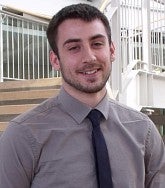Despite having less than three weeks to plan, the University of Oregon's first ever hackathon, Hacktown USA, was a huge success. It sold out days in advance and secured 10 local sponsors. UO students at Hacktown USA programmed for 26.2 consecutive hours (a marathon) over the October 24-25 weekend. Hackathons are intensive prototyping experiences that are increasingly popular for students to engage in as innovative experiential learning opportunities.

How the UO's Hacktown USA came to be is a story in and of itself. According to UO senior John Brawner, a double degree candidate in business and computer science and one of the organizers of Hacktown USA, it all started when he first met Kate Harmon, undergraduate program manager for the Lundquist Center for Entrepreneurship.
Harmon has produced hackathons as vehicles to drive cross-campus student innovation and to help develop a campus startup culture at other universities, and she approached Brawner about an idea she had to create QuackHack, a three-day hackathon at UO in January being organized by the Lundquist Center for Entrepreneurship.
“She was interested in my dual area interest, and as vice president of the Entrepreneurship Club, I was excited about being able to bring my two areas of focus together through such an event," said Brawner. “As we discussed what the QuackHack hackathon could look like, my computer science colleagues, Jeff Bayes and Daniel Krell, and I got super excited about the event. We discussed how it would benefit the student organizing committee if we tried to produce a smaller hackathon ahead of QuackHack to learn best practices. We planned Hacktown USA 19 days from that point."
Brawner noted that since the university had never done a hackathon before, he was worried that they might not be able to pull it off.
“But then once we started, it kept gaining momentum, and students were really interested. There were a lot of people working hard to help us including the Lundquist Center for Entrepreneurship, the the computer and information science department, and RAIN@UO," he said.
The theme of the Hacktown USA was APIs, which stands for application programming interfaces. An API is like a request broker: you ask a program or web service a specific question, and it returns to you with a response.
“It's basic enough that we had students from CIS 210, which is the entry into that major and who had only had four weeks of programming experience, working on this," noted Brawner.
Brawner said that 40 students participated in Hacktown USA and that they had to deny people at the door. In addition to the reward of pulling of the UO's first hackathon, the event's success also validated Brawner's choice to enroll at the University of Oregon.
“I transferred here my junior year, and I came here because of the entrepreneurship program," said Brawner. “It's being able to see both sides of the party. It's kind of different people that get attracted to both entrepreneurship and computer science. And being able to bridge that gap between two types of people is something that I thought would be very valuable, and I'm seeing that it is."
With the success for Hacktown USA behind him, Brawner is now on to helping organize QuackHack, the three-day hackathon that will take place in January in the Lillis Business Complex. The theme of QuackHack is gaming, which includes video games, education technology, e-sports, board games, and recreational games, allowing students of all majors to participate in this 40+ hour event.
“It's nice to have months, and not a few days to plan," noted Brawner. “Additionally, I'm really looking forward to business students using their skills to develop a business model around the prototypes that teams will be producing. If an actual business develops out of this event, even better."
Brawner also wants QuackHack to the largest ever hackathon in the state.
“I heard that the biggest hackathon in Oregon was able to get 150 people, and I would love to destroy that number and be the biggest one," he said. “I think that's very plausible. If we could hit 200, that would be awesome."
Andrew Rogers, an undergraduate journalism student, contributed to this article.

